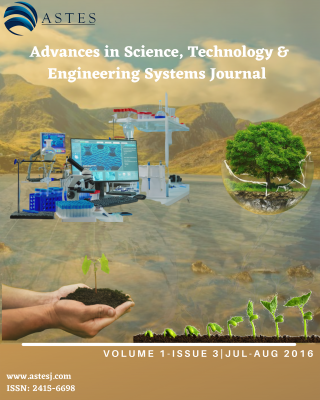
Download Complete Issue
Current Issue features key papers related to multidisciplinary domains involving complex system stemming from numerous disciplines; this is exactly how this journal differs from other interdisciplinary and multidisciplinary engineering journals. This issue contains 2 accepted papers in electrical engineering and environmental sciences domain.
Editorial
Front Cover
Adv. Sci. Technol. Eng. Syst. J. 1(3), (2016);
Editorial Board
Adv. Sci. Technol. Eng. Syst. J. 1(3), (2016);
Editorial
Adv. Sci. Technol. Eng. Syst. J. 1(3), (2016);
Table of Contents
Adv. Sci. Technol. Eng. Syst. J. 1(3), (2016);
Articles
Electrical Engineering
An Efficient Approach of Load Shifting by Using SCADA
Usman Sohail, Muhammad Muneer, Faraz Khan
Adv. Sci. Technol. Eng. Syst. J. 1(3), 1-6 (2016);
View Description
The consumption of electric power has increased significantly in the past few years, and its demand is still increasing every day. In this regard, its proper distribution is a significant challenge. This paper includes a method not only to improve the existing power distribution by using SCADA but also to reduce the human errors from the system by making the system automated. As a prototype for this paper, a geographical area was divided in to three regions named as A-Islamabad, B-Rawalpindi and C-Attock. These three regions were used as the Remote Terminal Units RTU’s and were further divided into four sectors based on different types of consumers. One main control unit was set to handle the whole power system which was referred to as the MTU (master terminal unit). MTU was designed in such a way that not only it was capable to show RTU’s readings on Graphical user interface-GUI but also to control them. By establishing such a design, distribution of electric power based on priority was achieved among these regions and thus the load requirements were managed by means of priorities among them. The entire load management task was supervised by an individual who was authorized to control the MTU’s GUI. SCADA system enabled the MTU to regulate the electric power in regions and their sectors. All the RTU’s were connected with the MTU by means of a wireless network based on an Internet Service Provider (ISP). If the system works accordingly, the MTU would be able to access the RTU’s from any part of the world. SCADA provides a platform to manage the overall system with the minimal manpower; hence, the human errors were reduced.
Environmental Sciences
Assessment of Wastewater in Duhok Valley, Kurdistan Region/Iraq
Najmaldin E. Hassan, Musher R. Ahmed Al-barware
Adv. Sci. Technol. Eng. Syst. J. 1(3), 7-13 (2016);
View Description
In order to characterize the waste water in Duhok valley in Duhok governorate, during 25km, seven sites were selected in Duhok valley, to represent their water quality. Monthly samples were collected from the Duhok valley for the period from, April to September, 2015. The qualitative study of Duhok valley water tested, as considered one of the main sources of water pollution for Musol Lake. The physical and chemical test for water samples are taken from different locations in Duhok valley. To know the degree of pollution, and the impact of self-purification processes to improve water quality before arriving to the Mosul Lake, and the indicated results of the study a lack of dissolved oxygen in the water (DO). And high organic load values, (BOD) and most of the bad qualities during water passage within the city of Duhok, while meat a significant improvement in the quality of water downstream before arriving at the dam Lake, is attributed to the effect of operations of self- purification ability of water. In spite of salinity problems and toxicity, the quality of water is suitable for irrigation crops on both sides of the valley .The all samples were tested for conductivity, TDS, pH, total hardness, chloride, alkalinity, sulfate, BOD, and phosphate, according to the standard methods.
